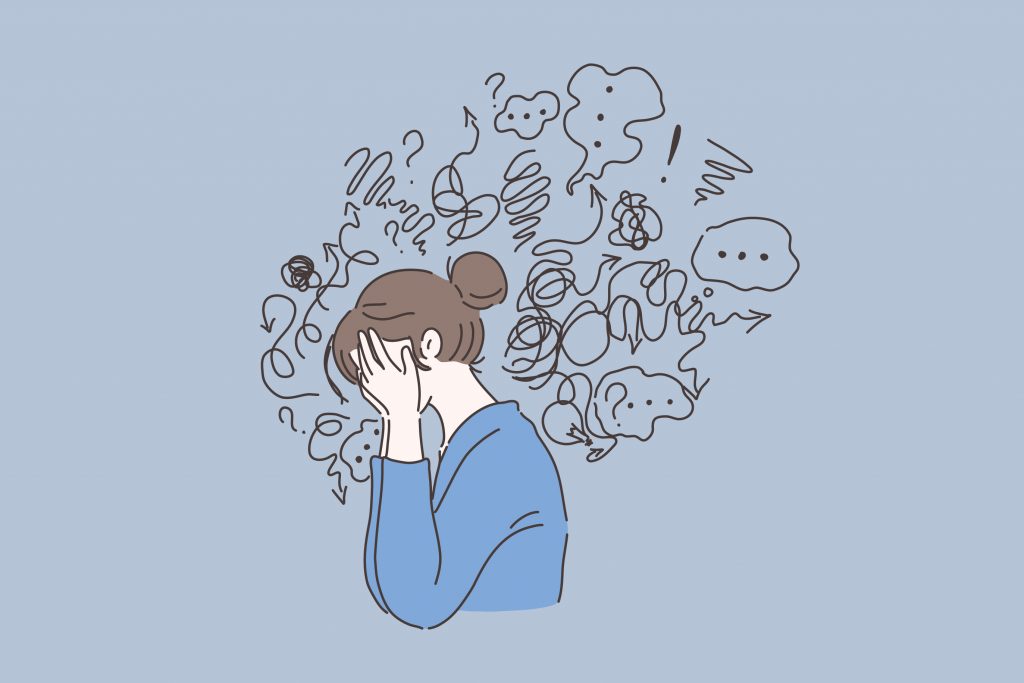Anxiety disorders are types of mental health problems, like feeling overly worried, scared of certain things, or having sudden panic. They include general anxiety, social fears, specific fears (like fear of open spaces or small spaces), and panic attacks. Sometimes, feeling very sad or down is connected to these anxiety issues. These problems are quite common and can affect a lot of people nowadays.
Feeling nervous sometimes is okay, but anxiety disorders are more serious. They’re a group of mental health issues that make you feel super anxious and scared all the time. This intense anxiety might make you avoid things like work, school, family events, and social situations that could make your feelings worse. In this article, we will be learning in detail about anxiety disorders.

What are Some of the Common Symptoms of Anxiety Disorders?
- Anxiety disorders involve persistent and distressing fears or thoughts that disrupt daily life.
- Individuals with these disorders may experience panic or anxiety attacks, marked by:
- Panic, fear, and uneasiness
- Feelings of doom or danger
- Sleep problems
- Inability to stay calm and still
- Shortness of breath
- Heart palpitations (uneasy heart conditions)
- Dry mouth
- Nausea
- Tense muscles
- Dizziness
- Persistent rumination, repeatedly thinking about a problem and unable to stop
- Inability to concentrate
- Intense or obsessive avoidance of feared objects or places
- Efforts to avoid situations that trigger anxiety or panic are common among those with anxiety disorders.
Diagnosing Anxiety Disorders
Symptoms Check: If you’re showing signs of anxiety, your doctor will ask about your health and how you’re feeling.
Rule Out Other Issues: Tests might be done to make sure no other health problems are causing your symptoms. But, there’s no specific test just for anxiety.
See a Specialist: If there’s no physical cause, your doctor may send you to a mental health expert, like a psychiatrist or psychologist. They’ll talk to you and use tools to figure out if you have an anxiety disorder.
How Long and How Bad: The length and intensity of your symptoms are important for the diagnosis.
Talk About Daily Life: Let your doctors or counsellors know if anxiety makes it hard for you to do everyday tasks at home, work, or school.
Screening for Kids and Teens: For children and teens aged 8 to 18, doctors recommend checking for anxiety. Adolescents aged 12 to 18 should also be screened for major depressive disorder (MDD).
Remedies for Anxiety Disorders
When you’re dealing with a lot of anxiety, there are various ways to get support. Some people find relief by taking medications, such as antidepressants or anti-anxiety drugs. These medicines can help calm your mind and ease physical symptoms. Another helpful approach is talking to someone about what you’re going through. A trained professional, like a counsellor or therapist, can provide valuable insights and teach you practical strategies to manage your thoughts and emotions.
This process, often known as psychotherapy or talk therapy, involves having conversations with a mental health specialist. They listen to your feelings and thoughts, offering guidance to help you understand and cope with your challenges. One specific type of talk therapy is Cognitive Behavioral Therapy (CBT), which focuses on transforming negative thoughts into positive ones. It’s like learning new skills to face situations without feeling overwhelmed by anxiety.
In simpler terms, getting help for anxiety can involve talking to someone who knows how to guide you through tough times and, if needed, using medications that can make things easier for your mind and body. It’s about finding the right support to help you feel better.
Conclusion
Tackling anxiety can be a tough task for anyone going through it. One should always look for professional help in case of anxiety as it might deteriorate their entire life. Anxiety remains one of the major problems in the lives of people throughout the world. And for a better global future, we must take it seriously! Sound mental health is a must to maintain sound physical health.
